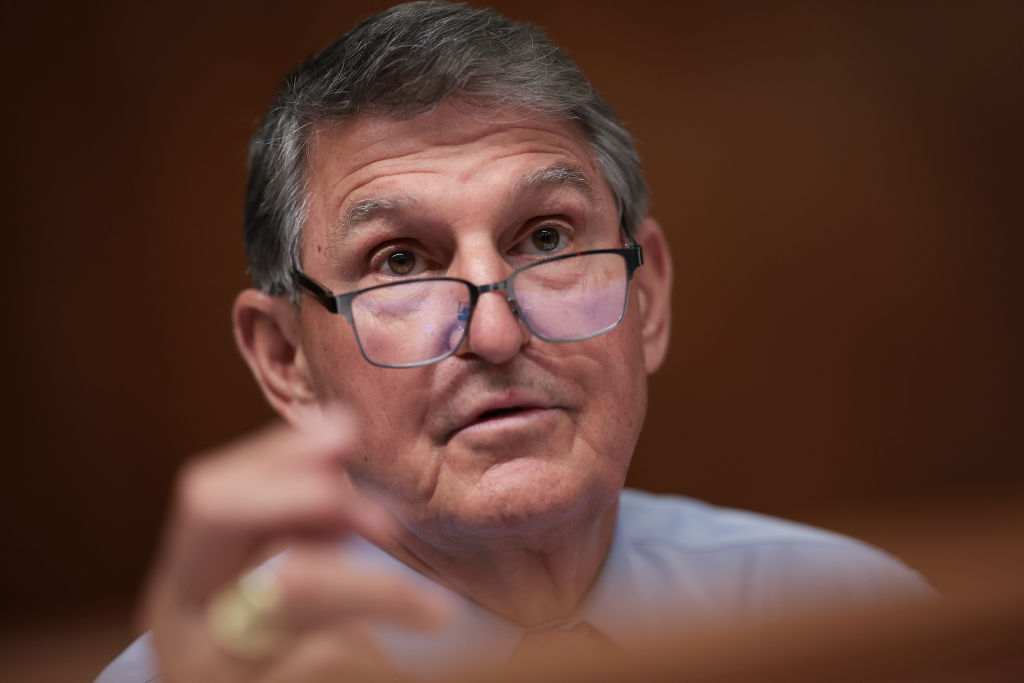The centrist group No Labels held a coming out party for itself in New Hampshire this week. In an event at St. Anselm College — a regular stop for presidential hopefuls — West Virginia senator Joe Manchin and former Utah governor Jon Huntsman talked up the prospects of a third-party run and the market for a ticket that appeals to the exasperated and underserved middle ground of American politics.
Meanwhile, No Labels is getting more specific about what its approach to 2024 will be. Until this week, the group had been noncommittal about exactly which Democratic and Republican candidates it would challenge, and when it would make a call on entering the race. Now No Labels has stated its position: if by Super Tuesday (March 5) it is clear that 2024 will be a Biden-Trump rematch, the group will gauge public appetite for an alternative and select a Republican-Democratic ticket at a convention in Dallas in April.
The loudest criticism of the well-funded No Labels challenge comes from supporters of the incumbent president, the assumption being that he stands the most to lose from the presence of a moderate alternative in the race.
In an interview on Sunday, No Labels co-founder (and former senator) Joe Lieberman addressed this charge. “We’re not in this to be spoilers,” he said. “If the polling next year shows, after the two parties have chosen their nominees, that in fact we will help elect one or another candidate, we’re not going to get involved.”
For all the things a third-party run has going for it this cycle — two unpopular frontrunners and a disillusioned electorate — Lieberman’s defensiveness demonstrates some of the internal contradictions of No Labels’ plan. A candidate who is scared of being seen to impact a race in one direction or another is not a candidate likely to be taken seriously. A group only content to do damage to the established party candidates if it can do so in an even-handed fashion is not likely to make much progress.
A better answer from Lieberman would have been to simply state what plenty of voters believe: that neither Joe Biden nor Donald Trump are fit for the job, that he and his No Labels colleagues are simply offering voters the alternative they deserve, and that what happens next is up to the American people. Without that kind of straight talking, I suspect No Labels will soon come unstuck.
Much — including whether they do more damage to Trump or Biden — depends on who ends up fronting the No Labels bid. For now, the organization is making all the right people nervous. Whatever happens next year, No Labels could at least focus minds in the near term, reminding both sides of the lack of enthusiasm with which most of the country views the two men most likely to end up as the party’s nominees.
On our radar
TRUMP ON TRIAL Donald Trump suffered a legal setback today, when a federal judge ruled that the criminal case brought against the former president by the Manhattan district attorney would not be moved to a federal court, as Trump’s legal team had hoped.
KERRY STRIKES OUT John Kerry’s trip to China appears to have been a dud. After four days of pleading with CCP officials to cooperate with the United States on climate change, Kerry has returned empty-handed. “We had a very extensive set of frank conversations and realized that it’s going to take a little bit more work to break the new ground,” Kerry said of the trip.
What’s inside the NDAA?
Every year, the National Defense Authorization Act (NDAA) sails through Congress on a bipartisan basis. 2023 looks different, however — thanks in large part to a series of headline-grabbing amendments on a series of social issues.
The bill is a great opportunity for policy-oriented lawmakers to punch above their weight class, if they can sneak amendments in — and many did just that; Representatives Alexandria Ocasio-Cortez and Dan Crenshaw joined forces to push for research into how psychedelic drugs can help active-duty service members suffering from traumatic brain injuries.
Several key policy areas, like combatting China and protecting domestic supply chains, are also addressed in a slew of amendments led by members of the Republican Study Committee.
One bigger theme throughout the amendment process I’m seeing is oversight. Amendments from Representatives Morgan Luttrell, Andy Barr, Jim Banks and Max Miller call for varying forms of monitoring everything from Iraq to electric vehicles to Iran to natural rubber, respectively.
There were also grounds for bipartisanship, like combatting the flow of fentanyl, spearheaded by Representatives Stephanie Bice and Salud Carbajal — who ultimately voted against the bill.
After the House version passed on heavily partisan lines, the Senate must craft its own; Republicans don’t control the chamber, but they’re spoiling for a fight. Senator Eric Schmitt inserted language for a DEI hiring freeze at DoD and Senator Steve Daines is previewing plans to ban drag shows on military bases in light of one performance for kids on Montana’s Malmstrom Air Force Base.
-Matthew Foldi
DeSantis goes mainstream
The start of Ron DeSantis’s return to mainstream media came Tuesday, when the Florida governor sat down for an interview with CNN’s Jake Tapper. Until now, DeSantis and his team have adopted a hostile stance to much of the traditional media. He (infamously) launched his campaign on Twitter and his spokespeople have spoiled for fights with mainstream reporters. But with DeSantis going nowhere in the polls, he has shaken up his team and adjusted his media strategy. Did it work? Politico’s media columnist Jack Shafer issues a resounding no. Mediaite’s Isaac Schorr offers a more positive review, noting that DeSantis is at his most compelling when he is picking apart media attacks.
If anything, the Tapper interview was a reminder that media strategy is only a part of DeSantis’s bigger problem: an uncertainty of what he stands for and who his constituency is. On a range of issues, form Trump and abortion to Ukraine, he opted for cautious hedges rather than the kind of clarity the voters likely want.
–OW
From the site
Ben Domenech: Trump versus the party
Emmet Penney: ESG is a surprise boon for fossil fuel giants
Daniel DePetris: What would Trump’s second-term foreign policy look like?
Poll watch
PRESIDENT BIDEN JOB APPROVAL
Approve 42.0% | Disapprove 53.4% | Net Approval -11.4
(RCP average)
2024 NEW HAMPSHIRE GOP PRIMARY
Trump 37% | DeSantis 23% | Scott 8% | Christie 6% | Burgum 6%
Haley 5% | Ramaswamy 5%
(UNH)
Best of the rest
Jeffrey H. Anderson, City-Journal: The allure of last time’s loser
David Byler, Washington Post: Racial identity is more fluid than you might think
Andrew Kerr, Washington Free Beacon: RBG’s $1-million prize
Ron Kampeas, Jerusalem Post: Trump holding Israel antiquities among items at Mar-a-Lago
Walter Russell Mead, Tablet: The A(braham) bomb
Christopher Cadelago, Politico: The corporate gig Katie Porter erased from her white board
Sign up to receive the DC Diary in your inbox on Mondays, Wednesdays and Fridays here.

























